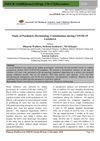 10 citations,
May 2015 in “International Journal of Women's Dermatology”
10 citations,
May 2015 in “International Journal of Women's Dermatology” New treatments for skin and hair disorders in women of color address unique biological differences and include specific acne medications, sunscreens, skin lighteners, and hair care adjustments.
 3 citations,
January 2020 in “Plastic and Aesthetic Research”
3 citations,
January 2020 in “Plastic and Aesthetic Research” Non-surgical procedures can help reduce wrinkles and stimulate skin repair by understanding skin aging at the molecular level.
 11 citations,
October 2021 in “Frontiers in Cell and Developmental Biology”
11 citations,
October 2021 in “Frontiers in Cell and Developmental Biology” Non-coding RNAs are important for hair growth and could lead to new hair loss treatments, but more research is needed.
 6 citations,
April 2004 in “Dermatologic Surgery”
6 citations,
April 2004 in “Dermatologic Surgery” Finasteride showed limited hair growth and low patient compliance in treating male pattern baldness.
 2 citations,
April 2013 in “Expert Review of Endocrinology & Metabolism”
2 citations,
April 2013 in “Expert Review of Endocrinology & Metabolism” Identifying nonclassic congenital adrenal hyperplasia and carriers of CYP21 mutations is challenging, and genetic counseling is recommended due to their prevalence.
 39 citations,
June 2019 in “Nanomaterials”
39 citations,
June 2019 in “Nanomaterials” Nanotube-based hair treatments could improve hair health and growth, and offer long-lasting effects.
2 citations,
December 2021 in “Pharmaceutics” Finasteride-loaded proniosomes effectively promote hair growth in mice.
 October 2022 in “JAAD international”
October 2022 in “JAAD international” Most patients with autoimmune blistering diseases experienced some hair loss, which may be underreported and linked to disease severity.
 December 2020 in “Journal of medical science and clinical research”
December 2020 in “Journal of medical science and clinical research” Most child skin problems during the COVID-19 lockdown were not emergencies and could have been handled by teleconsultation.
 1 citations,
October 2017 in “Dermatologic Clinics”
1 citations,
October 2017 in “Dermatologic Clinics” Men are increasingly using energy-based skin treatments for workplace success, with lasers and other devices effectively improving skin and body appearance.
 5 citations,
January 2017 in “Clinics in Dermatology”
5 citations,
January 2017 in “Clinics in Dermatology” Skin symptoms without a medical cause often reflect psychological stress and are influenced by culture, requiring a team approach for treatment.
 January 1998 in “British Journal of Plastic Surgery”
January 1998 in “British Journal of Plastic Surgery” The document lists 1998 plastic surgery events with details on topics, dates, locations, fees, and contact info.
 April 1999 in “Archives of Facial Plastic Surgery”
April 1999 in “Archives of Facial Plastic Surgery”  April 2021 in “Journal of Aesthetic Nursing”
April 2021 in “Journal of Aesthetic Nursing” The document suggests a 10-step plan to improve the non-surgical aesthetics and hair restoration industry.
 3 citations,
June 2006 in “Expert Review of Dermatology”
3 citations,
June 2006 in “Expert Review of Dermatology” The document concludes that hair loss is complex, affects many people, has limited treatments, and requires more research on its causes and psychological impact.
 3 citations,
July 2011 in “Expert Review of Dermatology”
3 citations,
July 2011 in “Expert Review of Dermatology” Effective treatments for excessive hair growth in women include creams, laser therapy, and medications, with the choice depending on individual needs and potential side effects.
 14 citations,
March 2012 in “Lasers in Surgery and Medicine”
14 citations,
March 2012 in “Lasers in Surgery and Medicine” A low-power, fast laser safely reduces hair with minimal pain and few side effects.
 11 citations,
January 1961 in “Archives of dermatology”
11 citations,
January 1961 in “Archives of dermatology” Corticosteroid injections helped eyebrow hair regrow in men with alopecia areata.
 April 1955 in “Archives of pediatrics & adolescent medicine”
April 1955 in “Archives of pediatrics & adolescent medicine” Children's skin diseases need special care and treatment.
 February 2008 in “Basic and clinical dermatology”
February 2008 in “Basic and clinical dermatology” Photographic imaging is crucial for documenting and managing hair loss, requiring careful preparation and standardization to be effective.
 34 citations,
October 2007 in “International Journal of Dermatology”
34 citations,
October 2007 in “International Journal of Dermatology” The most common causes of hair loss in children in South-East Nigeria are fungal infections and alopecia areata.
 62 citations,
July 1993 in “Journal of Investigative Dermatology”
62 citations,
July 1993 in “Journal of Investigative Dermatology” Hair growth is influenced by interactions between skin layers, growth factors, and hormones, but the exact mechanisms are not fully understood.
 24 citations,
January 1993 in “Dermatologic Clinics”
24 citations,
January 1993 in “Dermatologic Clinics” Minoxidil effectively treats hair loss, works better for women, and requires consistent use.
 73 citations,
March 2009 in “Seminars in Cutaneous Medicine and Surgery”
73 citations,
March 2009 in “Seminars in Cutaneous Medicine and Surgery” The document concludes that accurate diagnosis of hair disorders is crucial and requires a range of diagnostic methods.
 14 citations,
May 2011 in “Facial Plastic Surgery Clinics of North America”
14 citations,
May 2011 in “Facial Plastic Surgery Clinics of North America” Laser hair removal is effective for dark hair but needs improvement for nonpigmented or fine hairs.
 March 2024 in “Journal of skin and stem cell”
March 2024 in “Journal of skin and stem cell” Social media often spreads unreliable skincare advice, leading to potential skin problems, especially in teens.
 11 citations,
February 2008 in “British journal of nursing”
11 citations,
February 2008 in “British journal of nursing” Idiopathic hirsutism causes excessive hair growth in women, can be treated with medication and hair removal, but cannot be fully reversed.
 3 citations,
October 2007 in “Expert Review of Dermatology”
3 citations,
October 2007 in “Expert Review of Dermatology” Hair ages due to various factors and treatments like minoxidil and finasteride can help, but more research and better public awareness are needed.
 6 citations,
July 2006 in “International Journal of Dermatology”
6 citations,
July 2006 in “International Journal of Dermatology” Football players can get many skin conditions from their sport, which need different treatments and can be prevented with good hygiene and protection.
 49 citations,
November 1992 in “Archives of dermatology”
49 citations,
November 1992 in “Archives of dermatology” Different treatments for alopecia areata have varying success rates and side effects; intralesional steroids are most effective.




























